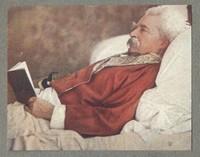Read this ebook for free! No credit card needed, absolutely nothing to pay.
Words: 48434 in 7 pages
This is an ebook sharing website. You can read the uploaded ebooks for free here. No credit cards needed, nothing to pay. If you want to own a digital copy of the ebook, or want to read offline with your favorite ebook-reader, then you can choose to buy and download the ebook.


: Mark Twain by Henderson Archibald Coburn Alvin Langdon Photographer - Twain Mark 1835-1910; Authors American 19th century Biography
"I've a theory that every author, while living, has a projection of himself, a sort of eidolon, that goes about in near and distant places, and makes friends and enemies for him out of folk who never knew him in the flesh. When the author dies, this phantom fades away, not caring to continue business at the old stand. Then the dead writer lives only in the impression made by his literature; this impression may grow sharper or fainter according to the fashions and new conditions of the time."
Letter of THOMAS BAILEY ALDRICH to WILLIAM DEAN HOWELLS of date December 23, 1901.
INTRODUCTORY
In the past, the attitude of the average American toward Mark Twain has been most characteristically expressed in a sort of complacent and chuckling satisfaction. There was pride in the thought that America, the colossal, had produced a superman of humour. The national vanity was touched when the nations of the world rocked and roared with laughter over the comically primitive barbarisms of the funny man from the "Wild and Woolly West." Mark Twain was lightly accepted as an international comedian magically evoking the laughter of a world. It would be a mis-statement to affirm that the works of Mark Twain were reckoned as falling within the charmed circle of "Literature." They were not reckoned in connexion with literature at all.
The fingers of one hand number those who realized in Mark Twain one of the supreme geniuses of our age. Even in the event of his death, when the flood-gates of critical chatter have been thrown emptily wide, there is room for grave doubt whether a realization of the unique and incomparable position of Mark Twain in the republic of letters has fully dawned upon the American consciousness. The literatures of England and Europe do not posit an aesthetic, embracing work of such primitive crudity and apparently unstudied frankness as the work of Mark Twain. It is for American criticism to posit this more comprehensive aesthetic, and to demonstrate that the work of Mark Twain is the work of a great artist. It would be absurd to maintain that Mark Twain's appeal to posterity depends upon the dicta of literary criticism. It would be absurd to deny that upon America rests the task of demonstrating, to a world willing enough to be convinced, that Mark Twain is one of the supreme and imperishable glories of American literature.
Until yesterday, Mark Twain vied with Tolstoy for the place of most widely read and most genuinely popular author in the world. In a sense not easily misunderstood, Mark Twain has a place in the minds and hearts of the great mass of humanity throughout the civilized world, which, if measured in terms of affection, sympathy, and spontaneous enjoyment, is without a parallel. The robust nationalism of Kipling challenges the defiant opposition of foreigners; whilst his reportorial realism offends many an inviolable canon of European taste. With all his incandescent wit and comic irony, Bernard Shaw makes his most vivid impression upon the upper strata of society; his legendary character, moreover, is perpetually standing in the light of the serious reformer. Tolstoy's works are Russia's greatest literary contribution to posterity; and yet his literary fame has suffered through his extravagant ideals, the magnificent futility of his inconsistency, and the almost maniacal mysticism of his unrealizable hopes.
"We think of Mark Twain not as other celebrities, but as the man whom we knew and loved," said Dr. Van Dyke in his Memorial Address. "We remember the realities which made his life worth while, the strong and natural manhood that was in him, the depth and tenderness of his affections, his laughing enmity to all shams and pretences, his long and faithful witness to honesty and fair-dealing.
"Those who know the story of Mark Twain's career know how bravely he faced hardships and misfortune, how loyally he toiled for years to meet a debt of conscience, following the injunction of the New Testament, to provide not only things honest, but things 'honourable in the sight of all men.'
"Those who know the story of his friendships and his family life know that he was one who loved much and faithfully, even unto the end. Those who know his work as a whole know that under the lambent and irrepressible humour which was his gift, there was a foundation of serious thoughts and noble affections and desires.
"Nothing could be more false than to suppose that the presence of humour means the absence of depth and earnestness. There are elements of the unreal, the absurd, the ridiculous in this strange, incongruous world which must seem humorous even to the highest mind. Of these the Bible says: 'He that sitteth in the heavens shall laugh; the Almighty shall hold them in derision.' But the mark of this higher humour is that it does not laugh at the weak, the helpless, the true, the innocent; only at the false, the pretentious, the vain, the hypocritical.
"Mark Twain himself would be the first to smile at the claim that his humour was infallible; but we say without doubt that he used his gift, not for evil, but for good. The atmosphere of his work is clean and wholesome. He made fun without hatred. He laughed many of the world's false claimants out of court, and entangled many of the world's false witnesses in the net of ridicule. In his best books and stories, coloured with his own experiences, he touched the absurdities of life with penetrating, but not unkindly, mockery, and made us feel somehow the infinite pathos of life's realities. No one can say that he ever failed to reverence the purity, the frank, joyful, genuine nature of the little children, of whom Christ said, 'Of such is the kingdom of heaven.'
Free books android app tbrJar TBR JAR Read Free books online gutenberg
More posts by @FreeBooks

: The Story of Siegfried by Baldwin James - Fantasy fiction; Siegfried (Legendary character) Fiction


: Four Years by Yeats W B William Butler - Poets Irish 20th century Biography; Yeats W. B. (William Butler) 1865-1939





